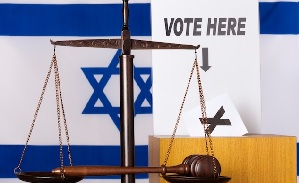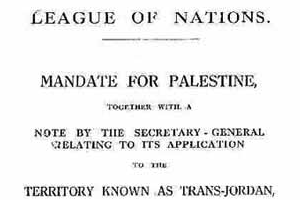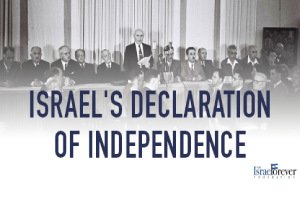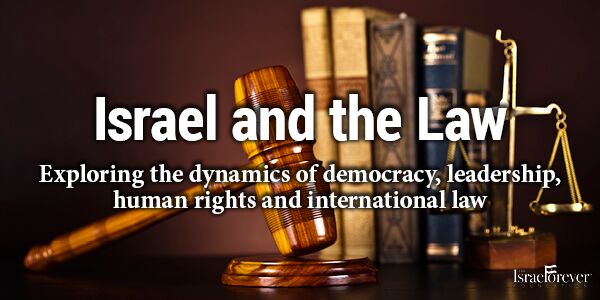The History of Israel as a Democratic Jewish State
"What, then are the 'core' characteristics shaping the minimum definition of the State of Israel as a Jewish State? These characteristics come from the aspects of both Zionism and heritage. At their center stands the right of every Jew to immigrate to the State of Israel, where the Jews will constitute a majority; Hebrew is the official and principal language of the State and most of its fests and symbols reflect the national revival of the Jewish People; The heritage of the Jewish People is a central component of its religious and cultural legacy". — Aharon Barak
The State of Israel defines itself as a parliamentary democracy: a democratic system of government in which all the citizens choose their representatives for parliament according to their political affiliation, and then the political parties choose their leaders.

Much of what we witness today replicated Herzl’s original vision. Having laid out plans for the creation of a Jewish state that dealt with Jewish immigration, treatment of and equality for women and minorities, health insurance, military service, official work hours/days, mandatory free education and the separation of religion and state. While democracy was not referenced, it had yet to become the prominent social and political framework that has since shaped nation-states in their form and format today.
While the term “democracy” is absent, Israel’s Declaration of Independence states the intention to: "Ensure complete equality of social and political rights to all its inhabitants irrespective of religion, race or sex: It will guarantee freedom of religion, conscience, language, education, and culture; it will safeguard the Holy Places of all religions; and it will be faithful to the principles of the Charter of the United Nations" and appeals to ]"the Arab inhabitants of the State of Israel to preserve peace and participate in the upbuilding of the State on the basis of full and equal citizenship and due representation in all its provisional and permanent institutions.”
Since no constitution had been passed by 1985, the Supreme Court ruled that the Declaration of Independence document is a guiding principle of Israeli society and its state, the need to legally define the Jewish nature and Democratic character of the State of Israel arose.
During the 1984 Knesset elections, religious ideas were brought up that were aimed at canceling the democratic character of Israel, and replacing it with a theocratic Halachic state, and thus in the eleventh Knesset session, the amendment to the Basic Law: the Knesset was passed (to become effective as of the Twelfth Knesset), that stipulated that:
"7A. A candidates list shall not participate in elections to the Knesset, if the goals or actions of the list, expressly or by implication, include one of the following:
(1) negation of the existence of the State of Israel as a Jewish and democratic state;
(2) incitement to racism;
(3) support for armed struggle by a hostile state or a terrorist organization against the State of Israel."
Since then, the definition of "a Jewish and democratic state" was used in additional Basic Laws of Israel: Basic Law: Human Dignity and Liberty and Basic Law: Freedom of Occupation, that were legislated in 1992, and amended in 1994. These laws specifically states that:

"1. The purpose of this Basic Law is to protect human dignity and liberty, in order to establish in a Basic Law the values of the State of Israel as a Jewish and democratic state." — Basic Law: Human Dignity and Liberty
"2. The purpose of this Basic Law if to protect freedom of occupation, in order to establish in a Basic Law the values of the State of Israel as a Jewish and democratic state." — Basic Law: Freedom of Occupation (1994)
According to Chief Justice Barak the minimal definition of "a Democratic State" is: "Recognition of the sovereignty of the people manifested in free and egalitarian elections; recognition of the nucleus of human rights, among them dignity and equality, the existence of separations of powers, the rule of law, and an independent judiciary system" — Aharon Barak 11-2-80/02
The growing diversity of Israeli Society has resulted in a some advances to the definition of "a Jewish and Democratic State" which currently includes the following components to appease the interests of all parties involved: "A Torah State" (Halachic state), "National-Religious State", "National Culture State", "The State of the Jewish People", "The Jewish State", and "The Jewish State and the State of all its citizens". And it is important to note of course that Jewish law pre-dates the emergence of the democratic process, and this is one of the reasons that it is difficult to apply halakhic concepts to the modern state of Israel. Professor Yedidia Stern makes a unique inquiry. “Is there such a thing as Zionist halakha? Can a legal code that is rooted in the Jewish past – and is geared toward defining proper behavior for individuals – help the Jewish nation grapple with present-day challenges in the public sphere? If we can answer these questions, we’ll be one step closer to calming the ideological competition, and freeing up the energies needed to create a vital, unified Jewish society in Israel and abroad.”
As Aharon Barak, former Supreme Court Justice, outlines, “the phrase “the values of the state of Israel as a Jewish and democratic state” as it appears in the Basic Laws reflects the uniqueness of the State of Israel and of Israeli society. We are not like all the nations, and we are not like all the peoples. We are a democracy, and our values are like the values of any democratic state. But we are also a Jewish state, and as such our values are the values of a Jewish state.
“Israeli society as a whole must come to grips with this duality. Intellectuals and researchers, rabbis and professors, students in yeshivas and universities–every sector of Israeli society–must ask themselves what are the values of the state of Israel as a Jewish and democratic state. We expect as well the contributions of intellectuals and researchers from around the world.”
Proper analysis enables us to conclude that Judaism as nationhood presents no conflict between a “Jewish statehood” bill and equality for all of Israel’s citizens. he Basic Laws, 11 in total, serve as the de facto constitution of Israel. Israel’s Jewish and democratic values are accorded supralegal-constitutional status and serve as a legal yardstick by which to measure the applicability of the Basic Laws.








